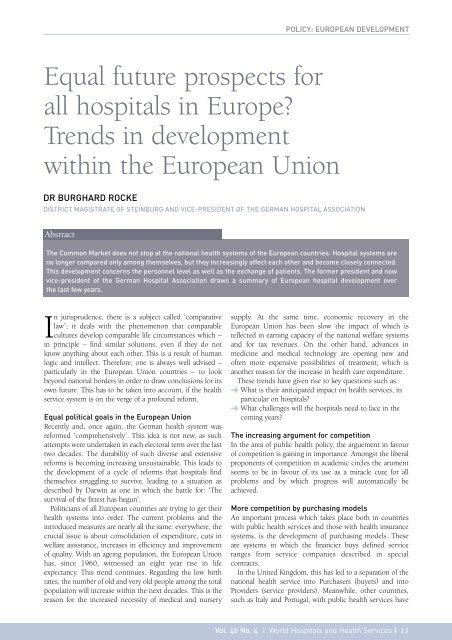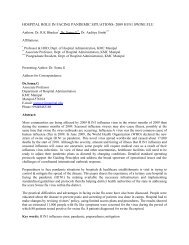World Hospitals and Health Services - International Hospital ...
World Hospitals and Health Services - International Hospital ...
World Hospitals and Health Services - International Hospital ...
Create successful ePaper yourself
Turn your PDF publications into a flip-book with our unique Google optimized e-Paper software.
POLICY: EUROPEAN DEVELOPMENT<br />
Equal future prospects for<br />
all hospitals in Europe?<br />
Trends in development<br />
within the European Union<br />
DR BURGHARD ROCKE<br />
DISTRICT MAGISTRATE OF STEINBURG AND VICE-PRESIDENT OF THE GERMAN HOSPITAL ASSOCIATION<br />
Abstract<br />
The Common Market does not stop at the national health systems of the European countries. <strong>Hospital</strong> systems are<br />
no longer compared only among themselves, but they increasingly affect each other <strong>and</strong> become closely connected.<br />
This development concerns the personnel level as well as the exchange of patients. The former president <strong>and</strong> now<br />
vice-president of the German <strong>Hospital</strong> Association draws a summary of European hospital development over<br />
the last few years.<br />
In jurisprudence, there is a subject called ‘comparative<br />
law’; it deals with the phenomenon that comparable<br />
cultures develop comparable life circumstances which –<br />
in principle – find similar solutions, even if they do not<br />
know anything about each other. This is a result of human<br />
logic <strong>and</strong> intellect. Therefore, one is always well advised –<br />
particularly in the European Union countries – to look<br />
beyond national borders in order to draw conclusions for its<br />
own future. This has to be taken into account, if the health<br />
service system is on the verge of a profound reform.<br />
Equal political goals in the European Union<br />
Recently <strong>and</strong>, once again, the German health system was<br />
reformed ‘comprehensively’. This idea is not new, as such<br />
attempts were undertaken in each electoral term over the last<br />
two decades. The durability of such diverse <strong>and</strong> extensive<br />
reforms is becoming increasing unsustainable. This leads to<br />
the development of a cycle of reforms that hospitals find<br />
themselves struggling to survive. leading to a situation as<br />
described by Darwin as one in which the battle for: ‘The<br />
survival of the fittest has begun’.<br />
Politicians of all European countries are trying to get their<br />
health systems into order. The current problems <strong>and</strong> the<br />
introduced measures are nearly all the same: everywhere, the<br />
crucial issue is about consolidation of expenditure, cuts in<br />
welfare assistance, increases in efficiency <strong>and</strong> improvement<br />
of quality. With an ageing population, the European Union<br />
has, since 1960, witnessed an eight year rise in life<br />
expectancy. This trend continues. Regarding the low birth<br />
rates, the number of old <strong>and</strong> very old people among the total<br />
population will increase within the next decades. This is the<br />
reason for the increased necessity of medical <strong>and</strong> nursery<br />
supply. At the same time, economic recovery in the<br />
European Union has been slow the impact of which is<br />
reflected in earning capacity of the national welfare systems<br />
<strong>and</strong> for tax revenues. On the other h<strong>and</strong>, advances in<br />
medicine <strong>and</strong> medical technology are opening new <strong>and</strong><br />
often more expensive possibilities of treatment, which is<br />
another reason for the increase in health care expenditure.<br />
These trends have given rise to key questions such as:<br />
➜ What is their anticipated impact on health services, in<br />
particular on hospitals?<br />
➜ What challenges will the hospitals need to face in the<br />
coming years?<br />
The increasing argument for competition<br />
In the area of public health policy, the arguement in favour<br />
of competition is gaining in importance. Amongst the liberal<br />
proponents of competition in academic circles the arument<br />
seems to be in favour of its use as a miracle cure for all<br />
problems <strong>and</strong> by which progress will automatically be<br />
achieved.<br />
More competition by purchasing models<br />
An important process which takes place both in countries<br />
with public health services <strong>and</strong> those with health insurance<br />
systems, is the development of purchasing models. These<br />
are systems in which the financier buys defined service<br />
ranges from service companies described in special<br />
contracts.<br />
In the United Kingdom, this has led to a separation of the<br />
national health service into Purchasers (buyers) <strong>and</strong> into<br />
Providers (service providers). Meanwhile, other countries,<br />
such as Italy <strong>and</strong> Portugal, with public health services have<br />
Vol. 40 No. 4 | <strong>World</strong> <strong><strong>Hospital</strong>s</strong> <strong>and</strong> <strong>Health</strong> <strong>Services</strong> | 15
















